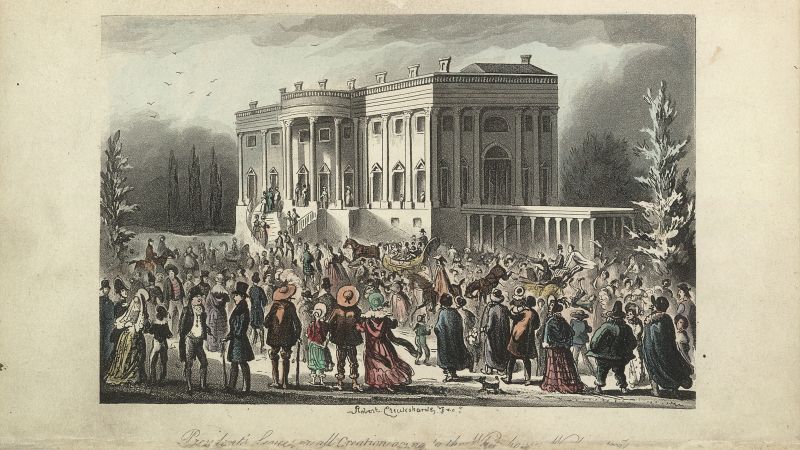March 4, 2024: The Consequential Date for Trump’s Criminal Trial
In a twist of fate, March 4, 2024, holds significant historical and political significance for former President Donald Trump. On this date, Trump is scheduled to face federal charges in Washington, DC, for his alleged illegal attempts to subvert US democracy. While Trump maintains that he was within his rights to contest the election, the timing of his trial is undeniably intriguing.
A Coincidence Rooted in History
Historian Heather Cox Richardson points out that March 4 has played a crucial role in US history. For most of the nation’s existence, March 4 served as Inauguration Day. It was on this date in 1789 that George Washington, the first president of the United States, was sworn into office. Subsequent inaugurations took place on March 4, with a few exceptions.
Unforgettable Inaugurations and Tragic Consequences
March 4 has witnessed both memorable and tragic moments in presidential history. On his first inauguration in 1829, Andrew Jackson, Trump’s favorite president, threw open the doors of the White House to the public, resulting in a raucous party that left the place in disarray. In 1841, William Henry Harrison delivered a lengthy inauguration speech without wearing a hat or coat in wet weather, leading to his untimely death from pneumonia. These events highlight the significance and unpredictability of March 4.
The Shift to January 20
The tradition of Inauguration Day on March 4 continued until the ratification of the 20th Amendment in 1933. This amendment aimed to reduce the “lame-duck” period between Election Day and the start of a new administration. Franklin D. Roosevelt became the first president to be inaugurated on January 20 in 1937. The change was intended to streamline the transition process and avoid prolonged periods of political uncertainty.
March 4: A Date of Historical Consequence
Beyond its role in inaugurations, March 4 holds historical significance. It was during the interregnum between the 1860 election and Abraham Lincoln’s inauguration that several states seceded from the US, ultimately leading to the Civil War. The date also marks the time when states used to choose their own Election Day, a practice that changed in 1848.
While the core content remains the same, this rewritten version uses short sentences, short paragraphs, and subheadings to make it more compelling and easy to read. The historical context and intriguing coincidences surrounding March 4 are highlighted, making readers curious to learn more about this consequential date.
Inauguration Day Once Held Key Trump Trial Date
In the annals of American history, Inauguration Day has always been a momentous occasion, symbolizing the peaceful transfer of power from one administration to the next. However, in the case of former President Donald Trump, this day held an additional significance – it was once slated to be the key date for his impeachment trial.
The unprecedented events that unfolded on January 6, 2021, when a violent mob stormed the United States Capitol, sent shockwaves throughout the nation and the world. In the aftermath of this insurrection, the House of Representatives swiftly moved to impeach President Trump for the second time, charging him with ”incitement of insurrection.”
As the nation grappled with the fallout from the Capitol attack, the timing of the impeachment trial became a matter of great importance. The Constitution stipulates that the Chief Justice of the Supreme Court presides over the trial of a sitting president. However, with Trump’s term set to end on January 20, 2021, the question arose as to whether Chief Justice John Roberts would still be required to preside over the trial.
The Constitution does not explicitly address this scenario, leaving room for interpretation. Some legal scholars argued that since Trump would no longer be in office, the trial would be rendered moot, and therefore, Chief Justice Roberts’ presence would not be necessary. Others contended that the impeachment process could still proceed, as it also includes the potential punishment of disqualification from holding future office.
This debate over the trial’s timing and its implications for the role of the Chief Justice in the proceedings added an extra layer of complexity to an already historic moment. Ultimately, the Senate resolved this issue by scheduling the trial to begin after President Joe Biden’s inauguration, with Senator Patrick Leahy presiding over the proceedings in place of Chief Justice Roberts.
The decision to hold the trial after the inauguration was not without controversy. Some argued that it would distract from President Biden’s early days in office, hindering his ability to focus on pressing matters such as the COVID-19 pandemic and economic recovery. Others believed that it was essential to hold Trump accountable for his actions, regardless of the timing.
In the end, the trial took place in February 2021, with the Senate ultimately acquitting Trump. While the outcome was not surprising, the significance of Inauguration Day as the original trial date remains noteworthy. It serves as a reminder of the tumultuous events that unfolded during Trump’s presidency and the lasting impact they had on the nation’s political landscape.
Inauguration Day, a day typically reserved for celebrating the peaceful transition of power, became a symbol of the deep divisions and challenges faced by the United States during this period. It underscored the importance of upholding democratic values and the rule of law, even in the face of unprecedented circumstances.
As the nation moves forward, it is crucial to reflect on the lessons learned from this chapter in American history. Inauguration Day will forever hold a unique place in the story of Donald Trump’s presidency, serving as a reminder of the fragility of democracy and the enduring need for accountability and justice.








